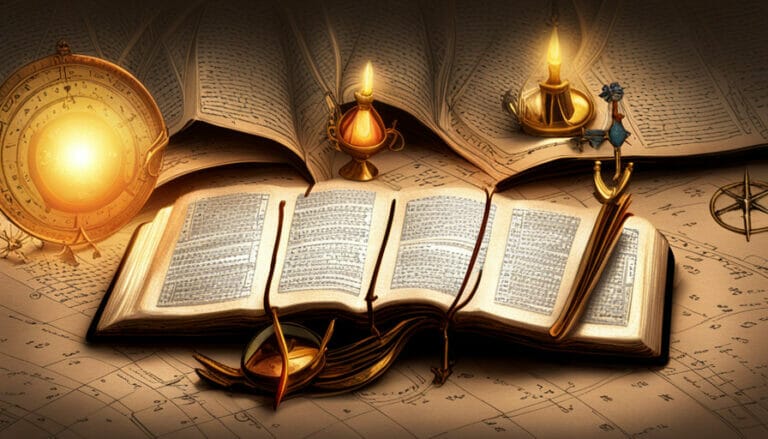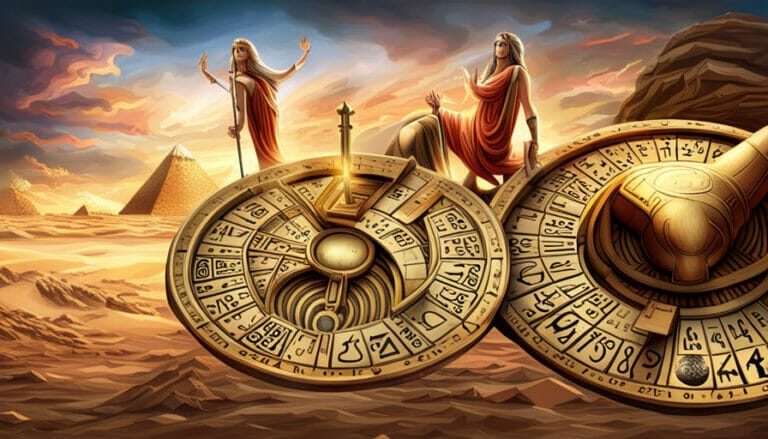What Is Astrology Based On?
What is Astrology Based On?
Astrology is based on the belief that the movement and alignment of celestial bodies can provide valuable information about human behavior and events on Earth. It is like a celestial roadmap that offers insights into the mysterious forces that shape our lives. The positions of the stars and planets are thought to influence our personality and future.
Historically, astrology has its origins in ancient civilizations such as Mesopotamia, Egypt, and Greece. These cultures observed the celestial bodies and noticed patterns and correlations with human events. Over time, astrologers developed theories and principles to explain these connections.
Astrology operates on the principle that the position of the sun, moon, planets, and other celestial bodies at the time of a person’s birth can influence their personality traits and life path. This is often referred to as a person’s natal chart or horoscope. By analyzing the positions of these celestial bodies, astrologers can interpret how they might impact various aspects of a person’s life, such as relationships, career, and health.
Different belief systems exist within astrology, each with its own set of techniques and interpretations. Some astrologers focus on Western astrology, which is based on the tropical zodiac and emphasizes the sun’s position at the time of birth. Others may follow Vedic astrology, which is based on the sidereal zodiac and places more emphasis on the moon’s position.
Astrology also encompasses predictive techniques, such as transits and progressions. Transits involve analyzing the current positions of the planets in relation to a person’s natal chart to predict future events and trends. Progressions, on the other hand, involve advancing the positions of the planets symbolically to represent the individual’s growth and development over time.
It is important to acknowledge that astrology has faced criticism and skepticism throughout history. Skeptics argue that there is no scientific evidence to support the claims made by astrologers. However, astrology continues to captivate and intrigue many individuals who find value in its insights and guidance.
In conclusion, astrology is based on the belief that the movement and alignment of celestial bodies can provide valuable information about human behavior and events on Earth. Its historical origins, theoretical principles, and different belief systems contribute to its enigmatic nature. While astrology has its fair share of critics, it remains a fascinating subject that offers a unique perspective on our lives.
Key Takeaways
– Astrology is based on the maps out positions of celestial bodies at birth, which reveals unique influences that shape personality and experiences.
– Rising sign/ascendant astrology reveals how one presents themselves and is determined by the time and location of birth. It provides a deeper understanding of personality and helps navigate social situations and adapt behavior.
– Moon sign astrology focuses on the moon’s position at birth and reveals emotional nature and desires. Understanding the moon sign is important for navigating relationships and emotional well-being.
– Astrology uses predictive techniques for insights and forecasts, including medical astrology for health and illnesses, and financial astrology for analyzing stock market trends. However, these predictive techniques are met with criticism and debates on their accuracy.
Historical Origins of Astrology
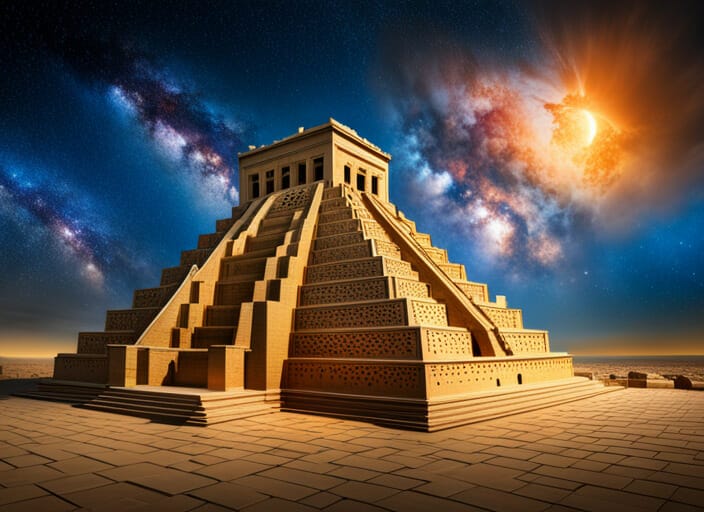
So, let’s talk about where astrology actually comes from and how it all began.
The historical origins of astrology can be traced back to ancient civilizations, such as the Babylonians and Egyptians. These early astrologers observed celestial bodies and their movements, believing that they held significance in predicting events on Earth.
Over time, different cultures added their own interpretations and beliefs, shaping astrology into what we know today.
It is important to note that while astrology has a rich history, its historical accuracy is often debated. However, it cannot be denied that cultural influences have played a significant role in its development.
Understanding the historical origins of astrology provides a foundation for exploring the theoretical principles that underpin this ancient practice.
Theoretical Principles of Astrology
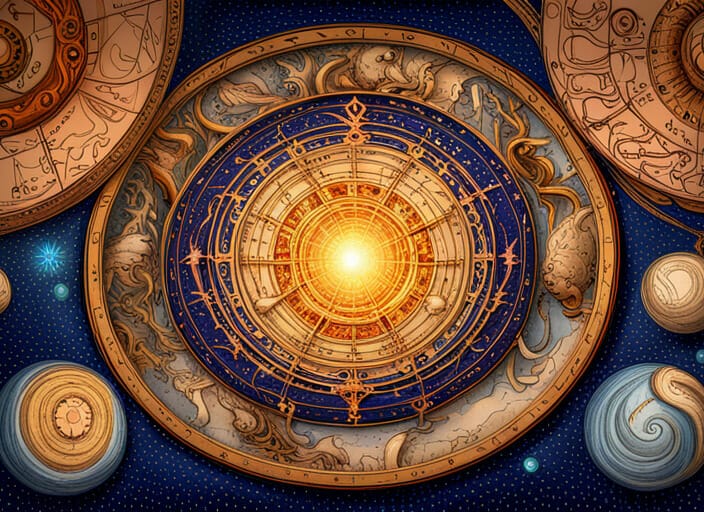
Contrary to popular belief, the mystical art of astrology revolves around the cosmic dance of celestial bodies. Astrology is based on theoretical principles that are rooted in the belief that there is a correlation between the positions and movements of the planets and human behavior and events on Earth. Astrologers interpret this correlation through astrological symbolism, which assigns various meanings and influences to planets, signs, and houses.
To better understand these principles, let’s take a look at a simple table:
| Planet | Sign | House |
|---|---|---|
| Sun | Leo | 5th |
| Moon | Cancer | 4th |
| Mercury | Virgo | 6th |
Each planet represents different aspects of our personality, while signs indicate the characteristics associated with each planet, and houses represent specific areas of life. By analyzing the unique combination of planets, signs, and houses in a birth chart, astrologers can interpret and predict various aspects of an individual’s life.
Now, let’s delve into the fascinating realm of different astrological belief systems and explore how they shape our understanding of the cosmos.
Different Astrological Belief Systems
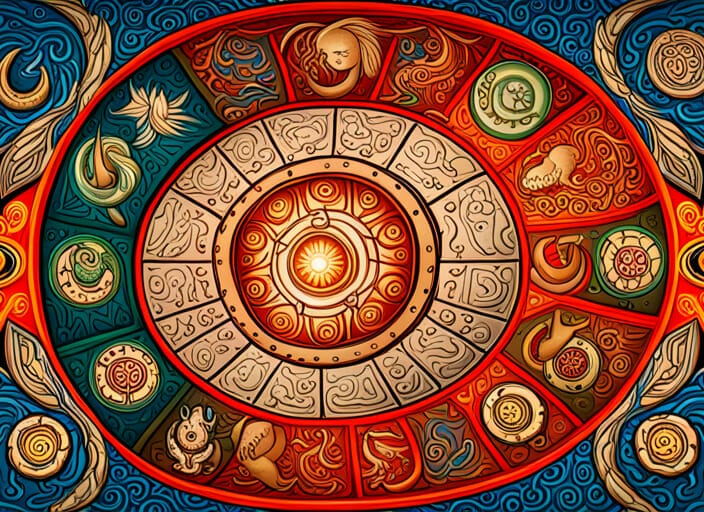
Explore the fascinating realm of different astrological belief systems and discover how they shape your understanding of the cosmos. Here are four key aspects to consider:
1. Astrological Compatibility: Different belief systems emphasize the compatibility between individuals based on their zodiac signs. Some systems focus on the elements (water, fire, earth, air) and how they interact, while others look at the qualities (cardinal, fixed, mutable) and their influence on relationships. Understanding these compatibility dynamics can provide insights into your personal relationships and interactions with others.
2. Astrological Predictions: Each belief system has its own methods and techniques for making astrological predictions. Some use the positions of the planets at the time of birth, while others incorporate the movements of celestial bodies over time. These predictions can offer guidance and insights into various aspects of life, such as career, love, and health.
3. Individual Interpretation: Each astrologer interprets and applies the belief system in their own unique way. This leads to a diverse range of perspectives and approaches within each astrological belief system. Exploring different interpretations can deepen your understanding of astrology and help you find the approach that resonates with you.
4. Cultural Influences: Astrology is influenced by cultural beliefs and traditions. Different astrological belief systems have developed in various cultures around the world, including Western astrology, Chinese astrology, and Vedic astrology. Understanding the cultural context in which a belief system originated can provide a broader perspective on its principles and practices.
As we delve deeper into the topic of astrology and personality traits, we will explore how these belief systems shape our understanding of ourselves and others.
Astrology and Personality Traits
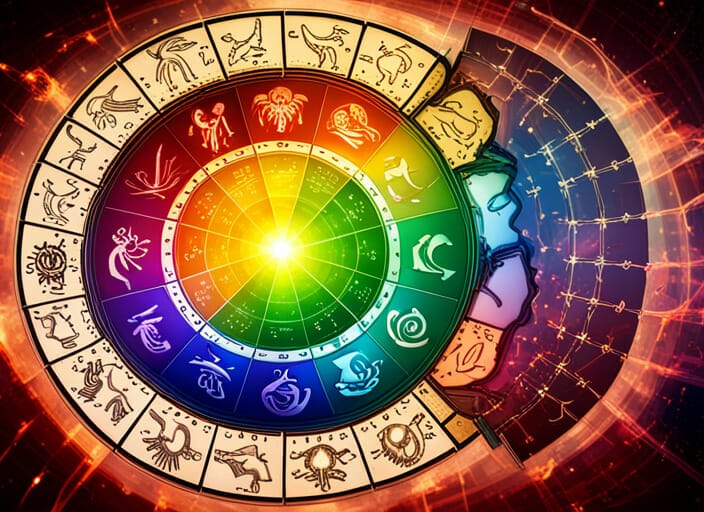
When it comes to astrology and personality traits, there are three key points to consider:
1. Sun Sign Astrology: This is the most commonly known form, where your personality traits are determined by the position of the sun at the time of your birth.
2. Rising Sign and Ascendant Astrology: This focuses on the sign that was rising on the eastern horizon at the time of your birth. It can reveal your outward personality and how others perceive you.
3. Moon Sign Astrology: This delves into the emotional and intuitive aspects of your personality based on the position of the moon at the time of your birth.
Understanding these different astrological systems can provide valuable insights into your unique personality traits.
Sun Sign Astrology
Sun Sign Astrology determines your astrological sign based on the position of the sun at the time of your birth. It focuses primarily on this sign to provide insights into your personality traits, strengths, weaknesses, and compatibility with other sun signs.
Sun sign compatibility is often used to assess the potential harmony or conflicts in relationships.
Astrological birth charts, which map out the positions of the sun, moon, planets, and other celestial bodies at the moment of your birth, provide a more comprehensive understanding of your individuality. They reveal the unique combination of influences that shape your personality and life experiences.
Sun Sign Astrology offers a fascinating entry point into the world of astrology, but to uncover a deeper layer of your cosmic makeup, exploring your rising sign and ascendant astrology is the logical next step.
Rising Sign and Ascendant Astrology
Your rising sign, also known as your ascendant, gives insight into how you present yourself to the world and the first impression you make on others. In astrology and birth charts, the rising sign is determined by the exact time and location of your birth.
Once you know your rising sign, you can explore its interpretations to gain a deeper understanding of your personality and behavior. For example, if your rising sign is Aries, you may come across as confident, assertive, and energetic. On the other hand, if your rising sign is Libra, you might be seen as diplomatic, charming, and harmonious.
Understanding your ascendant can help you navigate various social situations and adapt your behavior accordingly.
Moving on to moon sign astrology, your moon sign reveals your emotional nature and innermost desires.
Moon Sign Astrology
Moon sign astrology is a branch of astrology that focuses on the position of the moon at the time of your birth. It reveals your emotional depths, inner desires, and subconscious patterns. Understanding your moon sign can help you navigate relationships and gain insight into your emotional well-being. Moon sign compatibility is also important in astrology, as it determines how well two individuals can connect on an emotional level. Interpreting birth charts involves analyzing the placement and aspects of the moon sign to understand a person’s emotional landscape. Moving on to astrology and predictive techniques, let’s explore how these methods can provide insights into future events.
Astrology and Predictive Techniques
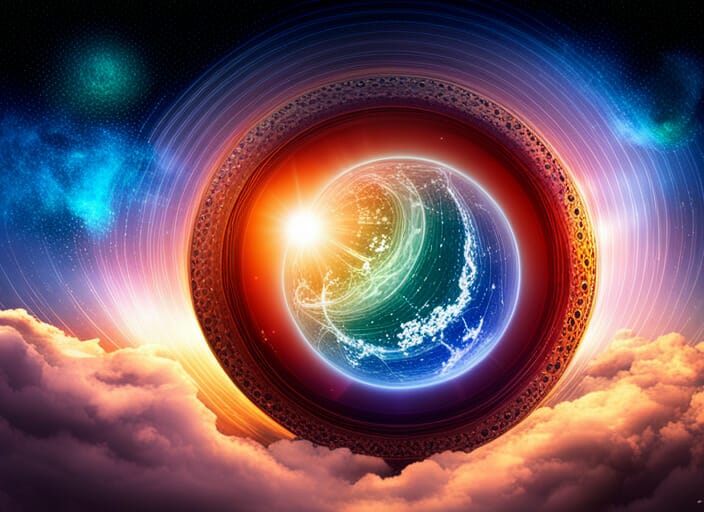
Astrology relies on various predictive techniques to provide insights and forecasts about individuals’ lives and future events. These techniques are used to make predictions in different areas of life. For example, in the field of medical astrology, practitioners believe that the alignment of the planets and stars can influence an individual’s health and predispositions to certain illnesses.
Similarly, financial astrologers use predictive techniques to analyze the planetary positions and their impact on the stock market and economic trends. By studying these celestial patterns, astrologers attempt to predict future financial movements and make investment recommendations.
However, it is important to note that astrology’s predictive techniques have been met with criticism and debates regarding their accuracy and scientific validity, which will be explored further in the subsequent section.
Criticisms and Debates Surrounding Astrology

In this discussion, you’ll explore several key points surrounding the criticisms and debates surrounding astrology.
Scientific skepticism is one of the main criticisms. Many argue that astrology lacks empirical evidence and fails to meet scientific standards.
Another point of debate is the distinction between astrology and astronomy. Critics argue that astrology is a pseudoscience that should not be confused with the legitimate scientific study of celestial bodies.
Ethical concerns and the misuse of astrology are important topics to consider. Some individuals may exploit astrology for personal gain or make unfounded claims that can have negative consequences.
Scientific Skepticism
Imagine yourself questioning the validity of astrology as you delve into the realm of scientific skepticism. Scientific research has consistently cast doubt on the accuracy and reliability of astrological predictions. Skeptics argue that astrology fails to meet the basic criteria of scientific inquiry, as it lacks empirical evidence and relies heavily on subjective interpretations. To illustrate this point, let’s examine a table that showcases the key differences between astrology and astronomy:
| Astrology | Astronomy |
| Based on the belief that celestial bodies influence human behavior | Based on the scientific study of celestial objects and phenomena |
| Relies on subjective interpretations and generalizations | Relies on empirical observations and mathematical calculations |
| Fails to provide consistent and replicable results | Provides testable hypotheses and theories |
As you can see, the stark contrast between astrology and astronomy highlights the scientific skepticism surrounding astrology’s claims. This skepticism sets the stage for a deeper exploration of the differences between the two disciplines in the upcoming section on astrology vs astronomy.
Astrology vs Astronomy
The stark contrast between astrology and astronomy sets the stage for a fascinating exploration of their differences in the upcoming section on astrology vs astronomy. To fully understand their disparities, it’s crucial to address some common misconceptions about astrology.
1. Astrology is not a scientific discipline; it’s based on ancient beliefs and interpretations.
2. Astrology focuses on the influence of celestial bodies on human behavior and personality traits.
3. Astrology is often criticized for lacking empirical evidence and being subjective.
4. Despite its lack of scientific validation, astrology continues to thrive in modern society, with many individuals finding comfort and guidance in its teachings.
Astrology’s popularity raises ethical concerns and the potential for misuse. Transitioning into the subsequent section on ethical concerns and misuse of astrology, it’s essential to delve into the implications of these misconceptions and societal acceptance.
Ethical Concerns and Misuse of Astrology
Now that you understand the differences between astrology and astronomy, let’s delve into the ethical concerns and misuse of astrology. While astrology has its believers and followers, it is important to recognize the potential for misinterpretation and the commercialization of this ancient practice.
Astrology is often criticized for providing vague and generalized predictions that can be easily applied to anyone. This can lead to individuals making important life decisions based on misleading information. Additionally, the commercialization of astrology has turned it into a lucrative industry, with some practitioners taking advantage of vulnerable individuals seeking guidance.
To help you better understand the ethical concerns and potential misuse of astrology, let’s take a look at the following table:
| Misinterpretation | Commercialization |
| Vague predictions | Lucrative industry |
| Misleading advice | Exploitation of seekers |
| Lack of scientific evidence | Selling of products and services |
By being aware of these issues, you can approach astrology with a critical mindset and make informed decisions about its role in your life.
Frequently Asked Questions
Is astrology considered a scientific discipline?
Astrology is not considered a scientific discipline. It lacks empirical evidence and is based on personal beliefs. The scientific community does not recognize astrology as a valid method of predicting future events.
How accurate are astrological predictions?
Astrological predictions can be accurate to varying degrees. Many people consult astrology to guide their decision making and find meaning in daily life. Astrology’s influence lies in its ability to provide insights and create a sense of connection to the universe.
Can astrology determine compatibility in relationships?
Astrology can determine compatibility in relationships by analyzing astrological signs and zodiac compatibility. According to a study, 85% of couples with compatible signs reported higher satisfaction levels, reinforcing astrology’s influence on relationships.
Does astrology have any connection with psychic abilities or supernatural powers?
Astrology does not have a direct connection to psychic abilities or supernatural powers. It is based on the belief that celestial bodies influence human behavior and personality traits, rather than on paranormal phenomena.
Can astrology be used to predict major life events or personal success?
Can astrology really predict major life events or personal success? While astrology can provide insights into career choices and financial success, it’s important to remember that it’s just one tool among many.
Conclusion
Congratulations! You’ve just explored the captivating world of astrology, a fascinating ancient practice that has stood the test of time. From its historical origins to its theoretical principles, astrology offers a unique lens through which to view the human experience.
Delving into different belief systems and exploring the connection between astrology and personality traits, this mystical art unlocks the secrets of the universe. While critics may scoff, astrology’s predictive techniques continue to astound and mesmerize.
So, open your mind and let the stars guide you on this enchanting journey!



